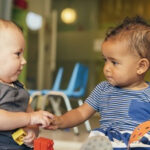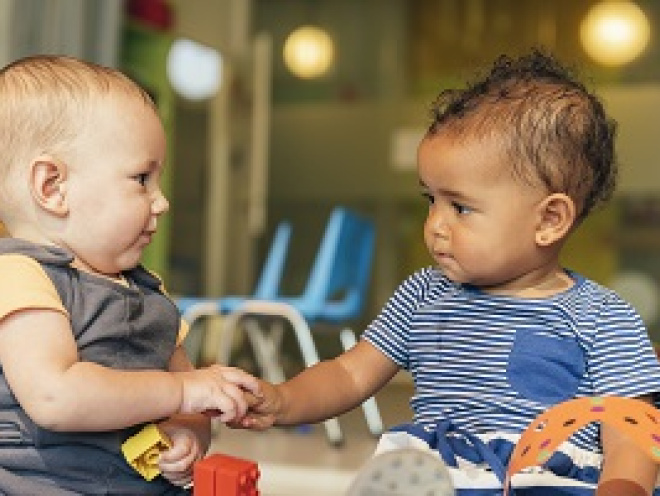As a parent or daycare provider, you understand that early childhood is not just about academics but also about promoting emotional growth. Creating a daycare environment that supports emotional development can be tricky, but it’s key to a child’s future well-being.
Emotional skills form the foundation for managing relationships, stress, and life’s challenges. It’s natural to worry that some daycares might focus too much on academics and overlook emotional growth. If this sounds familiar, you’re in the right place.
This article provides actionable strategies for seamlessly integrating emotional growth into your daycare curriculum.
Understanding Emotional Growth in Early Childhood
Emotional growth refers to how children learn to understand, express, and manage their emotions. This growth is essential during the early years because it forms the foundation for a child’s future emotional well-being.
When children develop strong emotional skills early on, they are better equipped to form healthy relationships, handle stress effectively, and show empathy toward others.
Emotional development is just as important as cognitive learning in a daycare setting. Emotionally secure children are more likely to engage positively with their peers, communicate their needs, and handle challenges with confidence.
The early years are especially important for this growth, as young children’s brains are highly receptive to learning about emotions and social interactions.
The Role of Daycare
For many children, daycare is where they spend much of their day interacting with peers and caregivers. Depending on how it is structured, this environment can either support or hinder their emotional growth.
A well-designed daycare curriculum that emphasises on emotional development has a long-term positive impact on children. Activities that encourage sharing, cooperative play, and emotional expression can help youngsters learn how to control their emotions and interact with others.
Key Components of an Emotionally Supportive Daycare Curriculum
#1 Safe and Nurturing Environment
Children need to feel secure and valued to thrive emotionally. When children know they are in a space where they are cared for and respected, they are more likely to open up, express their feelings, and engage positively with others.
Creating this environment starts with the daycare staff. Caregivers should build trust with each child by being consistently kind, patient, and attentive.
Simple gestures like warmly greeting each child, offering comfort when upset, and showing genuine interest in their activities can make a significant difference.
It’s also important to establish routines that give children a sense of predictability, which helps them feel secure.
Children should feel that they are part of a community within the daycare. Activities that promote teamwork, group discussions, and collaborative play can help children build connections with their peers and feel like they belong to something larger than themselves.
#2 Social-Emotional Learning (SEL) Programs
These programs help children understand and manage their emotions, set positive goals, show empathy for others, and maintain healthy relationships. Including Social-Emotional Learning (SEL) in the daycare curriculum boosts emotional development, giving kids the skills they need to handle life’s ups and downs.
SEL activities can involve group discussions where children talk about their feelings in different situations. These role-playing exercises help them practice empathy or mindfulness sessions that teach them how to stay calm and focused.
These exercises teach youngsters to notice their own emotions, comprehend the emotions of others, and build the tools they need to deal with challenging feelings constructively.
#3 Incorporating Play and Creative Expression
Through play, children explore their world, experiment with social roles, and express their emotions in natural and enjoyable ways. A daycare curriculum that integrates play and creativity can greatly support a child’s emotional development.
Specific activities that promote emotional expression include:
- Role-playing games: These games let children act out different scenarios, helping them understand various emotions and perspectives.
- Storytime discussions: Caregivers can ask children how certain characters might feel and why, encouraging empathy and emotional awareness.
- Music and dance: This allows children to express their emotions through movement and sound, helping them release and process feelings in a healthy way.
Practical Strategies to Foster Emotional Growth
#1 Emotional Literacy Activities
A great way to foster emotional growth in daycare children is through emotional literacy activities. These activities help kids recognise, identify, and label their emotions, the first step toward managing them effectively.
Emotion charts
- These charts typically display a range of emotions with corresponding facial expressions.
- Caregivers can use these charts during the day to help children point out their feelings.
- For example, if a child is upset, they can look at the chart and identify their emotion, such as “sad” or “angry.”
- This recognition helps children become more aware of their feelings and provides a starting point for discussing how to cope with them.
Storytelling
- During storytime, caregivers can choose stories that focus on emotions and ask children how they think the characters feel at different points in the story.
- This not only helps children understand their own emotions but also teaches them to recognise and empathise with the emotions of others.
#2 Mindfulness and Relaxation Techniques
Incorporating mindfulness and relaxation techniques into the daycare curriculum can help children develop self-awareness, manage stress, and build self-regulation skills, all of which are essential for emotional well-being.
Deep Breathing Exercises
- Teaching children to take deep breaths when they feel overwhelmed can help them calm down and think more clearly.
- For example, caregivers can guide children through a “balloon breathing” exercise, in which they imagine inflating a balloon with a deep breath and slowly releasing the air as they exhale.
Guided Relaxation
- This can involve a short story or visualisation where children are guided to imagine themselves in a peaceful setting.
- These relaxation sessions can be done at the beginning or end of the day to help children start or finish their day feeling calm and centred.
#3 Positive Reinforcement and Encouragement
When children receive praise and encouragement for expressing their emotions healthy, they are more likely to keep building those positive habits.
Daycare providers can consistently support emotional development through simple but meaningful actions.
For example, praising a child for sharing their toys or expressing their feelings in words rather than through actions helps reinforce these behaviours. Positive feedback like “I’m proud of you for telling your friend how you feel” encourages children to communicate their emotions openly.
Final Words
Take a moment to assess your current daycare practices. Are you supporting emotional growth alongside academics?
If you want to enhance your approach, consider exploring resources and training programs focused on early childhood emotional development.
Investing in emotional growth is an investment in a child’s future. By nurturing emotional skills, you’re helping children build the foundation they need for lifelong success and well-being.












